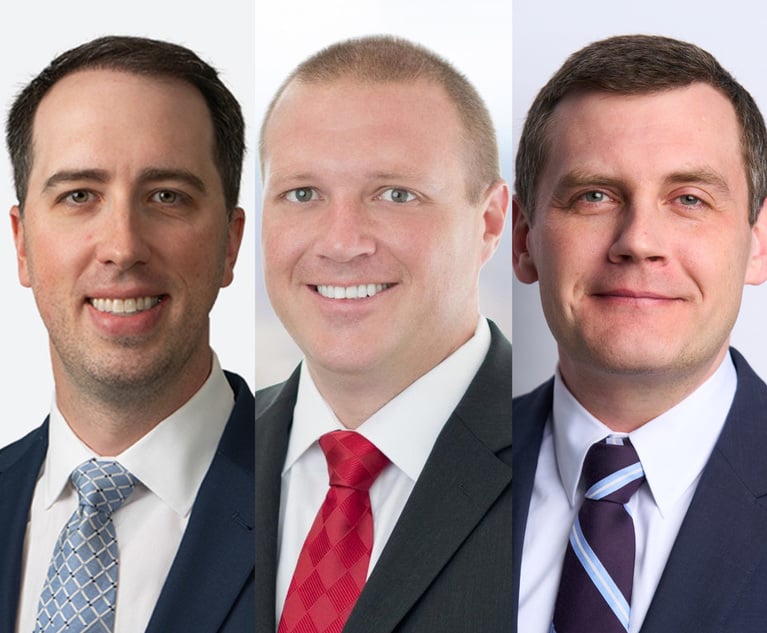 Shari Klevens (left) and Alanna Clair, Dentons. (Courtesy photo)
Shari Klevens (left) and Alanna Clair, Dentons. (Courtesy photo)Coworking Space: Risks for Practitioners
While the millennial-friendly trend of obtaining coworking space or sharing office space with other professionals or attorneys is becoming more commonplace, it can create some risk for practitioners and even confusion for clients.
December 16, 2019 at 12:45 PM
6 minute read
The costs of running a practice can be significant. From staff salary and filing fees to rent and office supplies, overhead for a law practice is rarely cheap. While some attorneys deal with these costs by starting law firms with many partners who all bear the costs, some solo practitioners are exploring the millennial-friendly trend of obtaining coworking space or sharing office space with other professionals or attorneys.
While such an approach is becoming more commonplace, it can create some risk for practitioners and even confusion for clients. For example, if David Smith and Susan Jones are solo practitioners who rent an office space together, they may choose to employ a single receptionist to greet clients. Thus, a client of David's in the office may see signage that identifies Susan Jones as another lawyer in the same space. David's client may even meet Susan or see that their receptionist handles both their files.
If David then misses a filing for his client, that client may similarly blame Susan Jones for failing to protect the client's interests. After all, they're part of the same law firm, aren't they? In that situation, a court may look at whether the client had a reasonable belief that its interests were being represented by Susan as well as David. Indeed, courts often examine this issue from the perspective of the client, so the surroundings of the office and the available information to the client could create risk for Susan.
Thus, it can be helpful for attorneys sharing office space with other attorneys or even other businesses to take steps to ensure that they are keeping their practices separate, both in practice and outwardly. Here are some tips to consider.
Signage and Advertising
When an attorney shares office space with other attorneys, the risk is that the client may reasonably believe that he or she is retaining a partnership of all attorneys in the office, instead of only a solo practitioner or a certain group of attorneys within the office. Thus, under a general partnership theory, the client may be able to allege a claim against all attorneys sharing the office space based on the conduct of any one attorney.
Compounding the risk of this unexpected liability is the likelihood that, for such claims, there may not be insurance coverage available. Indeed, legal malpractice policies may not provide coverage for a claim against someone like Susan Jones who is allegedly vicariously liable for the purported failings of David Smith.
One way to counteract this risk is to ensure that signage and advertising materials make clear to the outside world that an attorney sharing an office space with another is still a separate practice. Indeed, if two attorneys share a suite, it may be practical to have the signage read "The Law Office of David Smith" and "The Law Office of Susan Jones." Some attorneys will also include disclaimers on signage that indicate that the two law offices are separate entities and not affiliated with each other.
In addition to being helpful to clients, attorneys may have obligations under the ethical rules to ensure that their signage and other materials are not misleading to the public regarding whether the attorneys who share office space also share in partnership. Indeed, Rule 7.1 of the Georgia Rules of Professional Conduct provide that "a lawyer shall not make a false or misleading communication about the lawyer or the lawyer's services." Rule 7.5 goes on to say that an attorney shall not use a firm name or letterhead that violates Rule 7.1. Comment [1] to Rule 7.5 specifically provides: "Therefore, lawyers sharing office facilities, but who are not in fact partners, may not denominate themselves as, for example, 'Smith and Jones,' for that title suggests partnership in the practice of law."
Firm Materials and Operations
As noted above, office-sharing can be completely ethical. However, attorneys can take steps to minimize the risks inherent in sharing office space with others. For example, attorneys may consider using specific disclaimers clarifying that attorneys are part of separate law practices. Many attorneys who share office space also will use their engagement letters to specifically identify the attorney retained and to confirm that the attorney-client relationship does not extend to other attorneys sharing the space.
Attorneys sharing office space also can consider steps that confirm outwardly their independence from others in the same office. For example, attorneys can take steps to ensure that they take calls with clients in private, rather than in shared common areas with other attorneys. This helps maintain the privilege and confidences of the relationship, but may also serve as extrinsic evidence that the others in the suite do not share in that privilege or those confidences.
Separate Systems
Although attorneys can share the same building and even the same receptionist, most attorneys in that situation will not share the same filing cabinets or storage areas but instead will segregate files from other law practices or companies in the office. Attorneys may also take steps to ensure that mail or other confidential communications are directed to and opened by only those persons affiliated with the law practice. This can be helpful both for outward appearances (and confirmation of the attorney's independence) but also to help the attorney keep their obligation to maintain client confidences.
If an attorney in a coworking space shares computer systems or a network with others in the space, the attorney can consider steps that would restrict access to the system to only that attorney.
Some practitioners will train staff and others in the office how to answer typical questions the staff might be asked that reinforce the fact that the law practice is distinct from others within the office space.
Taking these precautions can help attorneys enjoy the benefits of keeping overhead down by sharing office space and minimizing the risks—and headaches.
Shari L. Klevens is a partner at Dentons in Atlanta and Washington, D.C., and serves on the firm's U.S. board of directors. She represents and advises lawyers and insurers on complex claims and is co-chair of Dentons' global insurance sector team.
Alanna Clair, also a partner at the firm in Washington, focuses on professional liability and insurance defense. Klevens and Clair are co-authors of "The Lawyer's Handbook: Ethics Compliance and Claim Avoidance" and the 2020 edition of "Georgia Legal Malpractice Law."
This content has been archived. It is available through our partners, LexisNexis® and Bloomberg Law.
To view this content, please continue to their sites.
Not a Lexis Subscriber?
Subscribe Now
Not a Bloomberg Law Subscriber?
Subscribe Now
NOT FOR REPRINT
© 2024 ALM Global, LLC, All Rights Reserved. Request academic re-use from www.copyright.com. All other uses, submit a request to [email protected]. For more information visit Asset & Logo Licensing.
You Might Like
View All
On The Move: Polsinelli Adds Health Care Litigator in Nashville, Ex-SEC Enforcer Joins BCLP in Atlanta
6 minute read
Akerman Opens Charlotte Office With Focus on Renewable Energy, Data Center Practices
4 minute read

Nelson Mullins, Greenberg Traurig, Jones Day Have Established Themselves As Biggest Outsiders in Atlanta Legal Market
7 minute readLaw Firms Mentioned
Trending Stories
- 1$1.9M Settlement Approved in Class Suit Over Vacant Property Fees
- 2Former Wamco Exec Charged With $600M 'Cherry-Picking' Fraud
- 3Stock Trading App Robinhood Hit With Privacy Class Action 1 Month After Alleged Data Breach
- 4NY High Court Returns Fired Priest's Discrimination Claim to State Agency
- 5Digging Deep to Mitigate Risk in Lithium Mine Venture Wins GM Legal Department of the Year Award
Who Got The Work
Michael G. Bongiorno, Andrew Scott Dulberg and Elizabeth E. Driscoll from Wilmer Cutler Pickering Hale and Dorr have stepped in to represent Symbotic Inc., an A.I.-enabled technology platform that focuses on increasing supply chain efficiency, and other defendants in a pending shareholder derivative lawsuit. The case, filed Oct. 2 in Massachusetts District Court by the Brown Law Firm on behalf of Stephen Austen, accuses certain officers and directors of misleading investors in regard to Symbotic's potential for margin growth by failing to disclose that the company was not equipped to timely deploy its systems or manage expenses through project delays. The case, assigned to U.S. District Judge Nathaniel M. Gorton, is 1:24-cv-12522, Austen v. Cohen et al.
Who Got The Work
Edmund Polubinski and Marie Killmond of Davis Polk & Wardwell have entered appearances for data platform software development company MongoDB and other defendants in a pending shareholder derivative lawsuit. The action, filed Oct. 7 in New York Southern District Court by the Brown Law Firm, accuses the company's directors and/or officers of falsely expressing confidence in the company’s restructuring of its sales incentive plan and downplaying the severity of decreases in its upfront commitments. The case is 1:24-cv-07594, Roy v. Ittycheria et al.
Who Got The Work
Amy O. Bruchs and Kurt F. Ellison of Michael Best & Friedrich have entered appearances for Epic Systems Corp. in a pending employment discrimination lawsuit. The suit was filed Sept. 7 in Wisconsin Western District Court by Levine Eisberner LLC and Siri & Glimstad on behalf of a project manager who claims that he was wrongfully terminated after applying for a religious exemption to the defendant's COVID-19 vaccine mandate. The case, assigned to U.S. Magistrate Judge Anita Marie Boor, is 3:24-cv-00630, Secker, Nathan v. Epic Systems Corporation.
Who Got The Work
David X. Sullivan, Thomas J. Finn and Gregory A. Hall from McCarter & English have entered appearances for Sunrun Installation Services in a pending civil rights lawsuit. The complaint was filed Sept. 4 in Connecticut District Court by attorney Robert M. Berke on behalf of former employee George Edward Steins, who was arrested and charged with employing an unregistered home improvement salesperson. The complaint alleges that had Sunrun informed the Connecticut Department of Consumer Protection that the plaintiff's employment had ended in 2017 and that he no longer held Sunrun's home improvement contractor license, he would not have been hit with charges, which were dismissed in May 2024. The case, assigned to U.S. District Judge Jeffrey A. Meyer, is 3:24-cv-01423, Steins v. Sunrun, Inc. et al.
Who Got The Work
Greenberg Traurig shareholder Joshua L. Raskin has entered an appearance for boohoo.com UK Ltd. in a pending patent infringement lawsuit. The suit, filed Sept. 3 in Texas Eastern District Court by Rozier Hardt McDonough on behalf of Alto Dynamics, asserts five patents related to an online shopping platform. The case, assigned to U.S. District Judge Rodney Gilstrap, is 2:24-cv-00719, Alto Dynamics, LLC v. boohoo.com UK Limited.
Featured Firms
Law Offices of Gary Martin Hays & Associates, P.C.
(470) 294-1674
Law Offices of Mark E. Salomone
(857) 444-6468
Smith & Hassler
(713) 739-1250






